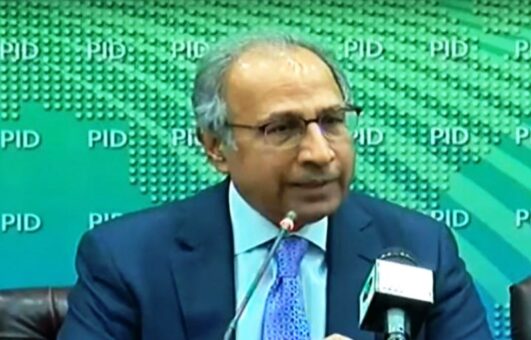KARACHI: Karachi Chamber of Commerce and Industry (KCCI) has demanded the Sindh government to suspend the sales tax collection by Sindh Revenue Board (SRB) for six months.
(more…)Author: Mrs. Anjum Shahnawaz
-

Weekly Review: Market to celebrate amnesty to black money
KARACHI: The stock market likely to maintain bullish trend during the next week owing to tax amnesty announced by the prime minister for construction sector.
Analysts at Arif Habib Limited said that the index to continue the rally as investors celebrate the government’s proactive stance to keep the economy afloat during the lockdown.
The government’s incentives package for the construction industry to keep economic activity upbeat should help sustain the positivity in the cement/engineering sector while oil scrips should be dictated by the developments regarding an emergency meeting of OPEC+ called by Saudi Arabia and its outcome.
The benchmark KSE-100 index of Pakistan Stock Exchange (PSX) is currently trading at a PER of 5.8x (2020) compared to Asia Pac regional average of 10.2x and while offering DY of around 8.8 percent versus around 3.1 percent offered by the region.
Following a 3-week rout of the KSE-100 Index, the bourse finally rebounded this week with a 12.5 percent return WoW – highest ever weekly return.
Optimism in the bourse was sourced from the federal government announcing a series of measures to mitigate risks to the economy from the COVID-19. Banks and E&P rallied as valuations had reached dirt cheap levels. Towards the end of the week President Trump’s announcement of a possible agreement between Saudi Arabia and Russia to cut production sent oil prices soaring (WTI up 18 percent WoW) and thereby E&P stocks.
The KSE-100 closed at 31,622 points (up by 12.5 percent / 3,512 points WoW).
Sector-wise positive contributions came from i) Commercial Banks (764 points), ii) Oil & Gas Exploration Companies (550 points) and iii) Cement (537 points). Scrip-wise positive contributions were led by HUBC (290 points), LUCK (227 points), and UBL (186 points).
Foreign selling continued this week clocking-in at USD 36.1 million compared to a net sell of USD 13.7 million last week. Selling was witnessed in E&Ps (USD 13.5 million) and Commercial Banks (USD 8.0 million).
On the domestic front, major buying was reported by Individuals (USD 13.0 million) and Funds (USD 10.3 million). Average Volumes settled at 228 million shares (up by 52 percent WoW) while average value traded clocked-in at USD 46 million (up by 66 percent WoW).
-

PM announces tax incentive package for construction industry
ISLAMABAD: Prime Minister Imran Khan on Friday announced a comprehensive tax incentive package for construction industry and allowed opening of activities in this sector from April 14, 2020.
According to state-run media the prime minister announced the opening of construction sector from April 14 to help the country’s daily wagers and laborers, affected by continued lockdown due to COVID-19 outbreak, to earn their livelihoods.
Talking to media-persons, he said the government’s decision taken in coordination with the provinces, was also aimed at reviving economic activities in the country, badly hit by the situation arising out of the coronavirus outbreak.
The prime minister also announced various incentives for the construction sector including tax incentives, waivers and subsidies in the areas of sales tax, capital gain tax, withholding tax etc.
Giving details of the decisions, he said that those investing in the construction sector during the year 2020, would not be asked any queries about the source of their income.
Secondly, the Prime Minister said, the government had also decided to bring the construction sector in the fixed-tax regime under which the rate of tax on land would be levied on the basis of per square yard and per foot.
He, however, added that those investing in the prime minister’s housing programme would be given 90 percent tax rebate and they would be required to pay just 10 percent of the total calculated tax amount on their projects.
Imran Khan said that it has also been decided to waive-off withholding in cement and steel sectors.
Besides, he said, that in coordination with the provincial governments of Punjab, Khyber Pakhtoonkhwa and Sindh, it has also been decided to bring the sales tax in construction sector to 2 percent through consolidation of all taxes.
The Prime Minister further said that Capital Gain Tax on the sale of house was also being done away with.
He also announced Rs. 30 billion subsidy for Naya Pakistan Housing Programme, adding, further subsidy would be given on its progress.
The Prime Minister said the government has also decided to give construction sector the status of industry.
It has also been decided to establish the Construction Industry Development Board (CIDB) to help promote the construction industry in the country, he added.
The Prime Minister said all the decisions regarding the COVID-19 were being taken in coordination with the provinces. However, he added, any of the provinces could make changes as per their requirements.
He said since the Rs. 1200 billion’s stimulus package announced by the federal government to provide financial relief to the poor and daily-wagers in the wake of lockdown due to Coronavirus outbreak, the government had decided to open the construction sector.
The prime minister said with the agriculture sector, which was already open, providing jobs to people in villages, the opening of construction sector, the main source of employment in urban areas, was very much needed.
-

FBR monitors tax refund repayments to ensure transparency
ISLAMABAD: Federal Board of Revenue (FBR) has initiated the monitoring to ensure transparency in repayment of tax refunds.
An office order circulated to all Regional Tax Offices (RTOs) and Large Taxpayers Units (LTUs), the FBR said that the prime minister had announced relief package for the industry which included tax refunds of Rs100 billion to industrial sector.
The FBR said that presently huge amount of sales tax refund claims were laying pending for replication/processing in each RTO/LTU.
The revenue body further said that in this emergency situation the genuine businesses/industries need liquidity to pay salaries to their employees.
The FBR directed the tax offices to process the sales tax refund claims immediately on urgent basis and sanction the admissible amount to the refund claimant as per law.
The FBR directed Chief Commissioner of RTOs/LTUs to monitor the process in order to maintain transparency and fairness.
The chief commissioners have also been directed to report the refund release to FBR on daily basis.
-

Rs100 billion released for tax refunds, duty drawback repayments
ISLAMABAD: In a bid to alleviate liquidity challenges faced by the industry, particularly in the aftermath of the COVID-19 pandemic and subsequent lockdowns, the government of Pakistan has disbursed a substantial amount of Rs 100 billion for the repayment of tax refunds and duty drawbacks.
(more…) -

Customs directs shipping lines, agents to withdraw delay, detention charges
KARACHI: Pakistan Customs on Friday directed shipping companies and shipping agents to extend waiver of delay and detention charges during lockdown to contain coronavirus.
Model Customs Collectorate (Enforcement &Compliance) Karachi issued instructions to chairman All Pakistan Shipping Association and chairman Pakistan Ship Agents Association to allow free time to importers.
The customs authorities said that Pakistan is currently facing a great challenge to address the issue of spread of coronavirus outbreak.
As a result of lockdown and restriction of movement of people / vehicle, the time duration of lifting the cargo from ports is exceeding the free-time as allowed to the importers under normal course of business.
The FBR has already issued similar instructions to container terminal operators on March 31, 2020 to waive demurrage and detention charges in order to facilitate importers and trade community in difficult times.
The collectorate said that considering the challenging scenario for importers and trade community the shipping lines and their agents should extend free-days in respect of container detention and not charge container detention charges and other charges in connection of late delivery of goods for the period from March 25, 2020 to April 16, 2020 in addition to free days already allowed by shipping lines and their agents.
-

SBP allows relief package relaxations to refinance scheme borrowers
KARACHI: State Bank of Pakistan (SBP) on Friday allowed easy loans, as allowed under relief package, to borrowers of refinance schemes.
In a statement issued the central bank said that it had allowed similar relaxations, as provided under the relief package, on its concessional refinance schemes.
The SBP is continuously reviewing the challenges arising out of COVID-19 pandemic situation with particular reference to the financial sector and taking measures.
Expanding the scope of its recently announced relief package for households and businesses, SBP has taken another major step today.
Under various refinance schemes loans are provided with preferential terms and conditions to promote growth in priority sectors of the economy.
Now the relaxation allowed for deferment in repayment of principal amount for one year for corporate, consumer, agriculture, SMEs and microfinance sectors, will now be available on financing of banks/ DFIs under SBP’s refinance schemes as well.
With this deferment of principal, the complete repayment schedule/tenor of the loan will be extended by one year.
The borrowers will, however, continue servicing their mark up during the period of principal deferment. In case borrowers are not able to service mark-up payment, banks/DFIs may reschedule/restructure the loan in such a manner that tenor of the loan can go up to one year beyond the existing maximum tenor of the respective scheme.
Borrowers of SBP’s following refinance schemes and their Shariah alternatives would benefit from this relaxation:
Long Term Financing Facility (LTFF)
Financing Facility for Storage of Agricultural Produce (FFSAP)
Refinance Facility for Modernization of SMEs
Refinance and Credit Guarantee Scheme for Women Entrepreneurs
Refinance Scheme for Working Capital Financing of Small Enterprises and Low-End Medium Enterprises
Small Enterprise (SE) Financing and Credit Guarantee Scheme for Special Persons
-

ABAD hails tax incentives for construction industry
KARACHI: Mohsin Sheikhani, Chairman, Association of Builders and Developers of Pakistan (ABAD) Mohsin Sheikhani on Friday termed the incentives announced by Prime Minister Imran Khan as a historic package for the construction industry of Pakistan and this package will prove a turning point for the economy of Pakistan.
Commenting on incentives announced for construction sector, Mohsin Sheikhani said that ABAD was demanding incentives for the construction sector because more than 70 allied industries are depending on construction sector. He said that we are indebted to Prime Minister for reviving the construction industry.
He said that Prime Minister has announced that no question will be asked about investment in construction sector this year, Fix Tax Regime (FTR) for construction sector, 90 percent Fixed Tax will be waved off if invested in Naya Pakistan Housing Scheme, With Holding Taxes waved off, Federal Government will discuss with Provinces regarding sales tax reduction. Punjab and KPK have reduced sales tax to 2 percent, no Capital Gain Tax will be charged in case of Family house sell, Rs 30 Billion Subsidy for Naya Pakistan Housing Scheme, Status of Industry to Construction sector and much awaited Construction Industry Development Board to be established for development of Construction Industry.
We wholeheartedly grateful to the Prime Minister and also request him to announce an universal policy for approval of building plans throughout Pakistan so builders and developers can start construction as early as possible.
-

Share market continues bullish trend, gains 839 points
KARACHI: The share market continued bullish trend on Friday and gained 839 points, which is mainly attributed to reports on package for construction industry to be announced.
(more…) -

Rupee gains 17 paisas on massive decline in import bill
KARACHI: The Pak Rupee gained 17 paisas against dollar on Friday on reports of significant decline in import bill for the month of March 2020, dealers said.
The rupee ended Rs166.76 to the dollar from previous day’s closing of Rs166.93 in interbank foreign exchange market.
The dealers said that importers were seen cautious to place orders for dollars after considering the latest numbers of imports for the month of March 2020.
The import bill of the country has declined by 21 percent in March 2020 over the previous month owing to lockdown to contain coronavirus pandemic.
The import bill was at $3.3 billion in March 2020 as compared with $4.185 billion in February 2020, according to data released by Pakistan Bureau of Statistics (PBS) on Friday.
Similarly, the pandemic also adversely affected the country’s exports. The exports fell by 15.56 percent to $1.8 billion in March 2020 as compared with $2.14 billion in February 2020.
The total import bill during July – March 2019/2020 fell by 14.42 percent to $38.81 billion as compared with $40.68 billion in the corresponding period of the last fiscal year.
However, the exports registered increase of 2.23 percent during first nine months of current fiscal year to $17.45 billion as compared with $17 billion in the corresponding months of the last fiscal year.
The trade deficit during first nine months contracted by 26.45 percent to $17.36 billion as compared with the deficit of $23.61 billion in the corresponding period of the last fiscal year.
